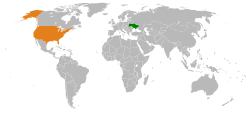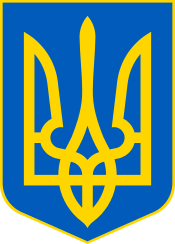Ukraine–United States relations
Ukraine–United States relations are bilateral relations between Ukraine and the United States of America.
 | |
Ukraine |
United States |
|---|---|
.jpg)
The United States officially recognized Ukrainian independence on December 25, 1991. The United States upgraded its consulate in the capital, Kyiv, to embassy status on January 21, 1992.[1] In 2002, relations between the United States and Ukraine deteriorated after one of the recordings made during the Cassette Scandal revealed an alleged transfer of a sophisticated Ukrainian defence system to Saddam Hussein's Iraq.
The current Chargé d'Affaires is a.i. William Taylor. The last Ambassador of the United States to Ukraine was Marie L. Yovanovitch, the seventh U.S. ambassador since Ukrainian independence.[2]
As of 2009, the United States supports Ukraine's bid to join NATO.[3]
According to documents uncovered during the United States diplomatic cables leak, American diplomats defend Ukrainian sovereignty in meetings with other diplomats.[4][5][6]
Ukrainians have generally viewed the U.S. positively, with 80% expressing a favorable view in 2002, and 60% in 2011.[7] According to the 2012 U.S. Global Leadership Report, 33% of Ukrainians approve of U.S. leadership, with 26% disapproving and 41% uncertain.[8]
History of relations
The United States enjoys cordially friendly and strategic relations with Ukraine and attaches great importance to the success of Ukraine's transition to a democracy with a flourishing market economy. Following a period of economic decline characterized by high inflation and a continued reliance on state controls, the Ukrainian government began taking steps in the fall of 1999 to reinvigorate economic reform that had been stalled for years due to a lack of a reform majority in the Ukrainian parliament. The Ukrainian government's stated determination to implement comprehensive economic reform is a welcome development in the eyes of the US government, and the U.S. is committed to supporting Ukraine in continuing on this path. Bilateral relations suffered a setback in September 2002 when the federal government of the U.S. announced it had authenticated a recording of President Leonid Kuchma's July 2000 decision to transfer a Kolchuga early warning system to Iraq. The Government of Ukraine denied that the transfer had occurred. Ukraine's democratic Orange Revolution has led to closer cooperation and more open dialogue between Ukraine and the United States. U.S. policy remains centered on realizing and strengthening a democratic, prosperous, and secure Ukraine more closely integrated into Europe and Euro-Atlantic structures.
.jpg)
A cornerstone for the continuing partnership of the US with Ukraine and the other post-Soviet states has been the Freedom for Russia and Emerging Eurasian Democracies and Open Markets (FREEDOM) Support Act (FSA), enacted in October 1992. Ukraine has been a primary recipient of FSA assistance. Total U.S. assistance since independence has been more than $3 billion. U.S. assistance to Ukraine is targeted to promote political and economic reform and to address urgent humanitarian needs. The U.S. has consistently encouraged Ukraine's transition to a democratic society with a prosperous market-based economy.
In November 2006, the Millennium Challenge Corporation (MCC) selected Ukraine to be eligible to apply for compact assistance. Ukraine already participates in the MCC Threshold Program, and in December 2006 signed a $45 million Threshold Program agreement. This program, which began implementation in early 2007, aims to reduce corruption in the public sector through civil society monitoring and advocacy, judicial reform, increased government monitoring and enforcement of ethical and administrative standards, streamlining and enforcing regulations, and combating corruption in higher education. Ukraine is beginning the process of developing a Compact proposal, and successful implementation of the Threshold Program will be necessary before the MCC will enter into a Compact with Ukraine.
The U.S. maintains an embassy in the Ukrainian capital Kyiv, and Ukraine maintains an embassy in the American capital Washington, D.C.
In addition to diplomatic support in its conflict with Russia, the U.S. provided Ukraine with USD$1.5 billion in military aid during the 2010s.[9]
Controversies
During the Ukrainian independence movement, on August 1, 1991, then-U.S.-President George H.W. Bush made a speech critical of the movement which James Carafano subsequently described as "what may have been the worst speech ever by an American chief executive".[10]
On 18 February 2009 the Verkhovna Rada of Crimea sent a letter to the Cabinet of Ministers of Ukraine and the President of Ukraine in which it stated that it deemed it inexpedient to open a representative office of the United States in Crimea and it urged the Ukrainian leadership to give up this idea. The letter will also be sent to the Chairman of the UN General Assembly. The letter was passed in a 77 to 9 roll-call vote with one abstention.[11]
In 2012 the United States Senate Committee on Foreign Relations passed Resolution 466, calling for the unconditional release of political prisoner Yulia Tymoshenko and implemented a visa ban against those responsible.[12] The resolution condemned the administration of Ukrainian President Viktor Yanukovych (in office: 2010-2014) and asked NATO to suspend all cooperative agreements with Ukraine.[13] In response, First Deputy General Prosecutor of Ukraine Renat Kuzmin wrote a letter to U.S. President Barack Obama, complaining that his visa was revoked.[14]
Since 2016 certain conspiracy-theories have complicated relations between Ukraine and the United States.
On June 8, 2017 an explosive device was hurled at the United States embassy in Kyiv.[15]
.jpg)
On December 22, 2017 the United States agreed to supply Ukraine with more lethal weapons, including Javelin anti-tank missiles.[18]
In 2018 the U.S. House of Representatives passed a provision blocking any training of Azov Battalion of the Ukrainian National Guard by American forces, citing its neo-Nazi background. In previous years, between 2014 and 2017, the U.S. House of Representatives passed amendments banning support of Azov, but due to pressure from the Pentagon, the amendments were quietly lifted.[19][20][21]
On April 25, 2018, 57 members of the House of Representatives, led by Ro Khanna,[22] released a condemnation of Holocaust distortion in Ukraine.[23] They criticized Ukraine's 2015 memory laws glorifying Ukrainian Insurgent Army (UPA) and its leaders, such as Roman Shukhevych.[24] The condemnation came in an open bipartisan letter to Deputy Secretary of State John Sullivan.[25]
On September 24, 2019 the United States House of Representatives initiated an impeachment inquiry against incumbent U.S. president Donald Trump in the wake of a scandal surrounding a phone conversation that Trump had with Ukrainian President Volodymyr Zelensky on July 25.[26] On August 12, 2019 an anonymous whistleblower had submitted a complaint to U.S. Inspector General Michael Atkinson that stated that Trump had allegedly attempted to pressure Zelensky into launching an investigation on former U.S. Vice President Joe Biden and his son, Hunter, during the phone call.[27] Trump held a meeting with Zelensky in New York City on September 25 where both presidents stated that Zelensky had not been pressured during the July phone call and that nothing out of the ordinary had occurred.[28]
Sister-Twinning cities












































Agreements and memorandums








































References
![]()
- "Background Notes: Ukraine 6/97". 1997-2001.state.gov. Retrieved 2019-11-21.
- Embassy_of_the_United_States,_Kiev
- Biden Says U.S. Still Backs Ukraine in NATO, New York Times (July 21, 2009)
- Bandera, Stephen (1 December 2010). "Holodomor, WikiLeaks and Russia's Single Historical Space". Kyiv Post. Retrieved 13 December 2010.
- After Russian invasion of Georgia, Putin's words stir fears about Ukraine. Kyiv Post (November 30, 2010)
- WikiLeaks: Vershbow defends Ukrainian sovereignty in meeting with Russians. Kyiv Post (November 29, 2010)
- Opinion of the United States Pew Research Center
- U.S. Global Leadership Project Report - 2012 Gallup
- "How U.S. Military Aid Has Helped Ukraine Since 2014". NPR.org. December 2019. Retrieved 12 June 2020.
- James Carafano, "How to be a freedom fighter", The Washington Examiner(Washington, D.C.), (April 4, 2011) - "President George H.W. Bush traveled to the Ukraine and delivered what may have been the worst speech ever by an American chief executive."
- Crimean parliament votes against opening U.S. diplomatic post, Interfax-Ukraine (18 February 2009)
- Senate Press Release
- Kyiv Post
- Kyiv Post
- "Explosive device goes off at U.S. Embassy in Kiev".
- "Ukraine's Neo-Nazis Won't Get U.S. Money". Bloomberg. 12 June 2015.
- "U.S. Soldier Plotted Attack, Wanted To Fight With Far-Right Ukrainian Paramilitary, Prosecutors Say". Radio Free Europe/Radio Liberty. September 23, 2019.
- "U.S. May Give Ukraine More Lethal Weapons As Tensions Rise With Russia, Official Says". Newsweek. 17 September 2018.
- Kheel, Rebecca (March 27, 2018). "Congress bans arms to Ukraine militia linked to neo-Nazis". TheHill.
- "Congress Has Removed a Ban on Funding Neo-Nazis From Its Year-End Spending Bill". The Nation. January 14, 2016.
- Sokol, Sam (January 18, 2016). "US lifts ban on funding 'neo-Nazi' Ukrainian militia". Jerusalem Post.
- History, Defending (April 25, 2018). "57 Members of US House of Representatives Condemn Holocaust Distortion in Ukraine and Poland".
- "Congress members urge US stand against Holocaust denial in Ukraine, Poland". The Times of Israel. April 25, 2018.
- "RELEASE: Rep. Khanna Leads Bipartisan Members In Condemning Anti-Semitism in Europe". April 25, 2018.
- "Congress members call out Ukraine government for glorifying Nazis - Jewish Telegraphic Agency". www.jta.org. April 25, 2018.
- Fandos, Nicholas (24 September 2019). "Nancy Pelosi Announces Formal Impeachment Inquiry of Trump". New York Times. Retrieved 27 September 2019.
- Przybyla, Heidi; Caldwell, Leigh Ann; Moe, Alex; Bennett, Geoff (26 September 2019). "Path toward impeachment takes shape with primary focus on Ukraine revelations". NBC News. Retrieved 27 September 2019.
- Law, Tara (25 September 2019). "'Nobody Pushed Me.' Ukrainian President Denies Trump Pressured Him to Investigate Biden's Son". TIME. Retrieved 27 September 2019.
Further reading
- Beebe, George. "Groupthink Resurgent" National Interest (Jan/Feb 2020), Issue 165, pp 5-10. Explores whether President Trump delayed military assistance to Ukraine in order to press for inappropriate political favors; also examines strategic competition in Ukraine between the West and Vladimir Putin's revanchist Russia.
- Buskey, Megan. "New Leader, Old Troubles" American Scholar (Winter 2020) 89#1 pp 6-11. re presidents Volodymyr Zelensky and Trump.
- Fedunkiw, Marianne P. "Ukrainian Americans." in Gale Encyclopedia of Multicultural America, edited by Thomas Riggs, (3rd ed., vol. 4, Gale, 2014), pp. 459–474. online
- Petrov, Valentyn V. "‘Grand Strategies’, Military And Political Doctrines Of The United States Of America: Trends Of Evolution After The End Of The Cold War. Lessons For Ukraine." Actual Problems Of International Relations 128 (2017): 40-50. online
- Plokhy, Serhii, and M. E. Sarotte. "The Shoals of Ukraine: Where American Illusions and Great-Power Politics Collide." Foreign Affairs 99 (2020): 81+ excerpt.
